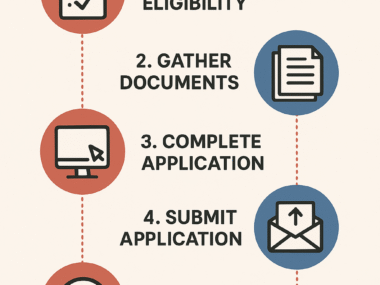How to Study and Work in Canada as an International Student
Canada has become one of the most popular destinations for international students across the globe. Known for its high-quality education, multicultural society, and welcoming immigration policies, Canada provides not only a conducive academic environment but also ample work opportunities for students who wish to gain international experience and earn money to support themselves during their studies.
Studying and working in Canada as an international student is a rewarding experience that opens the door to world-class education, invaluable work experience, and permanent residency opportunities. With proper planning, dedication, and determination, you can build a successful academic and professional future in Canada. Always stay informed through the official Canadian government websites and keep track of deadlines and immigration policy updates.
Whether you’re driven by academic goals, a desire for international exposure, or long-term immigration aspirations, Canada is a land full of promise and opportunity.
In this guide, we will explore in-depth how to study and work in Canada as an international student. The information will cover;
-
Why choose Canada
-
Requirements for international students
-
Application process
-
Getting a study permit
-
Working while studying
-
Post-graduation work opportunities
-
Costs, scholarships, and living arrangements
-
Tips for success
Why Choose Canada for Studying and Working?
Canada stands out as a top destination for international education for several reasons:
High-Quality Education
Canada is home to globally recognized universities and colleges like the University of Toronto, University of British Columbia, and McGill University. Institutions offer various academic programs that are research-intensive and career-oriented.
Diverse and Inclusive Society
Canada is a multicultural nation that embraces diversity. International students feel welcomed, respected, and integrated into society, making the transition smoother.
Work Opportunities
Canada allows international students to work up to 20 hours per week during academic sessions and full-time during scheduled breaks. Additionally, Canada offers post-graduation work permits (PGWP) that allow graduates to gain valuable work experience.
Pathway to Permanent Residency
Many international students use their education and work experience in Canada as a pathway to permanent residency through programs such as the Canadian Experience Class (CEC) and Provincial Nominee Program (PNP).
2. Eligibility Requirements for Studying in Canada
To study in Canada as an international student, the following requirements must be met:
Admission Requirements
-
Academic transcripts
-
English or French language proficiency (IELTS, TOEFL, or TEF)
-
Statement of Purpose
-
Letters of recommendation
-
Valid international passport
-
Portfolio (for design, arts, or creative programs)
Language Proficiency
Most universities require a minimum IELTS score of 6.5 overall, with no band less than 6.0. TOEFL requirements usually fall between 80 to 100 depending on the institution.
Financial Proof
You must prove that you have enough funds to cover:
-
Tuition fees
-
Living expenses
-
Return transportation
As of 2025, the financial requirement for a single student is approximately CAD $20,635 annually (not including tuition).
3. Choosing the Right Institution and Program
Designated Learning Institutions (DLIs)
Ensure you choose a school listed as a Designated Learning Institution (DLI). Only DLIs are authorized to host international students in Canada.
Researching Schools and Programs
When choosing a program:
-
Consider your career goals
-
Look at the curriculum structure
-
Check for co-op or internship opportunities
-
Evaluate tuition fees and scholarship options
Top Fields of Study in Canada
-
Information Technology
-
Engineering
-
Business and Management
-
Health Sciences
-
Social Sciences
-
Media and Communication
4. Application Process to Canadian Schools
Choose a Program and Institution
Identify the program that aligns with your academic background and career interests.
Prepare Required Documents
You’ll need:
-
Academic transcripts
-
English/French test scores
-
Passport
-
Statement of Purpose (SOP)
-
Letters of Recommendation
-
Resume/CV
Submit the Application
Apply online through the university’s website or centralized systems like the Ontario Universities’ Application Centre (OUAC).
Wait for the Offer Letter
Once accepted, you’ll receive a Letter of Acceptance (LOA) which is mandatory for applying for a study permit.
STUDY IN CANADA—APPLY NOW!
5. Getting a Study Permit
A study permit is a document issued by the Canadian government that allows foreign nationals to study at DLIs.
Application Process
Apply for a study permit either online or through a visa application center (VAC) in your country.
Required Documents
-
Letter of Acceptance
-
Proof of funds
-
Passport-sized photographs
-
Statement of Purpose
-
Medical examination (if required)
-
Police clearance certificate (if required)
-
Biometrics
Processing Time
The processing time varies by country. It usually ranges from 4 to 12 weeks. For faster processing, apply under the Student Direct Stream (SDS) if you’re from eligible countries like India, Nigeria, Philippines, or Vietnam.
6. Working While Studying in Canada
International students can work to support themselves and gain Canadian work experience.
On-Campus Work
You can work on campus without a work permit if:
-
You are a full-time student at a DLI
-
You have a valid study permit
Off-Campus Work
You can work up to 20 hours per week during regular semesters and full-time during scheduled breaks (e.g., winter and summer holidays).
To be eligible:
-
You must be a full-time student
-
Your study permit must include the condition that allows you to work off-campus
Co-op and Internships
Some programs require co-op placements. To work in a co-op program:
-
You need a co-op work permit
-
The work must be an essential part of your academic program
7. Post-Graduation Work Opportunities
Post-Graduation Work Permit (PGWP)
The PGWP allows students to work in Canada after graduation for up to 3 years, depending on the length of their study program.
Eligibility:
-
Graduated from a DLI
-
Program lasted at least 8 months
-
Applied within 180 days of receiving final marks
Applying for Permanent Residency
After gaining Canadian work experience, students can apply for PR through:
-
Canadian Experience Class (CEC)
-
Federal Skilled Worker Program (FSWP)
-
Provincial Nominee Program (PNP)
8. Cost of Studying and Living in Canada
8.1. Tuition Fees
Tuition varies based on the program and institution:
-
Undergraduate: CAD $15,000–$30,000/year
-
Postgraduate: CAD $15,000–$25,000/year
Cost of Living
Average monthly living costs:
-
Housing: CAD $600–$1,000
-
Food: CAD $300–$500
-
Transportation: CAD $100 to $150
-
Miscellaneous: CAD 100 to 200
Health Insurance
Most provinces require you to have health insurance. Some offer public health coverage, while others require private plans.
STUDY IN CANADA—APPLY NOW!
9. Scholarships and Financial Aid
Government Scholarships
-
Vanier Canada Graduate Scholarships
-
Canada-ASEAN Scholarships
-
Banting Postdoctoral Fellowships
Institutional Scholarships
Each university offers its own scholarships based on merit and need. Examples:
-
University of Toronto International Scholarships
-
UBC International Leader of Tomorrow Award
-
York University Global Leader of Tomorrow Scholarship
External Scholarships
-
Trudeau Foundation Scholarships
-
Commonwealth Scholarships
10. Accommodation Options
On-Campus Housing
Many institutions provide dormitory-style housing, ideal for new students.
Off-Campus Housing
Students can rent apartments or shared houses. Websites like Kijiji, RentFaster.ca, and Facebook Marketplace are commonly used to find listings.
11. Tips for International Students
Time Management
Balancing work and study is crucial. Create a schedule and prioritize tasks.
Build a Network
Engage in student clubs, attend workshops, and connect with professionals in your field.
Understand Your Rights
Know your rights as a worker in Canada, such as fair wages and safe working conditions.
Stay Within Work Limits
Do not exceed the 20-hour weekly work limit during academic sessions to avoid violations that can lead to deportation.
File Your Taxes
Even as a student, if you work in Canada, you must file taxes. You may even be eligible for tax credits or refunds.
12. Challenges and How to Overcome Them
Culture Shock
Solution: Attend orientation programs, make local friends, and keep in touch with your culture.
Weather
Canadian winters can be harsh. Invest in warm clothing and learn how to navigate icy conditions.
Academic Pressure
Seek academic support from school tutors or counseling services when stressed.
13. Summary of the Process
-
Research and select your program and institution (DLI)
-
Prepare and submit your application
-
Receive Letter of Acceptance
-
Apply for a study permit
-
Travel to Canada
-
Begin your studies
-
Work during and after your studies
-
Apply for PGWP and eventually PR
STUDY IN CANADA—APPLY NOW!
![]()


